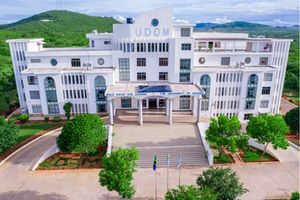Prime
Varsities' deputy Vice Chancellor-Research position sparks debate

Education, Science and Technology minister Adolf Mkenda gestures as he speaks in a past event. He announced a raft of initiatives yesterday. PHOTO | FILE
What you need to know:
- Experts in education and research on Friday, March 1, 2024, argued vehemently for its relevance and necessity in fostering academic excellence and societal impact.
Dar es Salaam. The role of a Deputy Vice Chancellor (DVC) responsible for research in Tanzanian universities is hanging in the balance, following recent hints from the minister for Education suggesting a reconsideration of the position.
However, experts in education and research on Friday, March 1, 2024, argued vehemently for its relevance and necessity in fostering academic excellence and societal impact.
While Prof Adolf Mkenda's critique of the position, citing potential hindrances and frustrations for researchers, raises valid concerns, education analysts believe that abolishing the DVC for research may overlook the multifaceted role it plays in university dynamics.
Speaking to lecturers at the Moshi Cooperative University (MoCU) recently, Prof Mkenda said, "They frustrate researchers; I think we will come to discuss the possibility of abolishing that title and reverting back to DVC Academic."
“If you ask universities or those lecturers, they will tell you we don't see the benefit of it; mainly, it just increases resources," he said.
But in an interview with The Citizen, an education policy and consultant, Dr Jane Mdoe, said, "The DVC for research serves as a strategic leader in advancing the institution's research agenda. Removing this position risks diluting the focus on research excellence."
She argued that top universities worldwide recognised the pivotal role of a dedicated research leadership position, emphasising that institutions like Harvard and Oxford had robust structures with dedicated Deputy Vice Chancellors or Vice Presidents solely focused on research.
“This specialisation allows for targeted efforts to advance knowledge, innovation, and societal impact. The ministry must conduct thorough research to inform its decision because, as far as I know, the core activity of any university is great research,” she said.
They said the distinction between DVC-research and DVC-academic affairs was crucial for the effective governance and operational efficiency of a university.
An education consultant based in Dar es Salaam, Dr Thomas Jabir, noted that the DVC for research spearheads strategic initiatives to enhance the institution's research output, funding opportunities, and collaborations, while the DVC for academic affairs focuses on curriculum development, teaching quality, and student success.
“Combining these roles, especially in our universities, where research output is still very low compared to counterparts globally, risks spreading resources too thin and further compromising effectiveness," he said.
The University of Dar es Salaam's emphasis on research underscores its commitment to addressing societal challenges and driving economic development.
A senior researcher at UDSM, whose name was withheld, asserted, "Our DVC for research plays a pivotal role in aligning our research priorities with national development goals, fostering interdisciplinary collaboration, and securing funding for impactful projects. Abolishing this position would undermine our ability to compete globally and address local needs effectively."
According to the office of the DVC-Research at UDSM, the office was established by the merging of the Directorates of Research (DR) and Public Services (DPS), with the DPS being re-organised and renamed the Directorate of Knowledge Exchange (DKE).
“Since its establishment, more developments have taken place, including the proposed establishment of the University of Dar es Salaam Innovation and Entrepreneurship Centre (UDIEC) by bringing together in one unit all units that deal with innovation and entrepreneurship development," the UDSM website states.
While concerns about bureaucratic hurdles and mismanagement are valid, experts advocate for refining existing structures rather than outright elimination.
A leading expert in research governance from the State University of Zanzibar (SUZA), Dr Salva Ahmed, suggested, "Instituting transparent accountability mechanisms and enhancing collaboration between academic and research portfolios can address concerns about inefficiency and duplication of efforts. Effective leadership and strategic planning are key in this matter."
In light of the insights, a balanced approach was necessary to optimise the effectiveness of research leadership within Tanzanian universities, she argued.
According to Dr Ahmed, "Rather than abolishing the position outright, stakeholders should engage in a comprehensive review of institutional structures, roles, and responsibilities to ensure alignment with evolving academic and societal needs. This process should involve input from faculty, researchers, administrators, and policymakers."
"Indeed, if the Ministry of Education is aware that this is what is happening, it should take disciplinary and ethical measures as outlined in the public service guidelines, rather than abolishing this crucial position at the university," she added.





